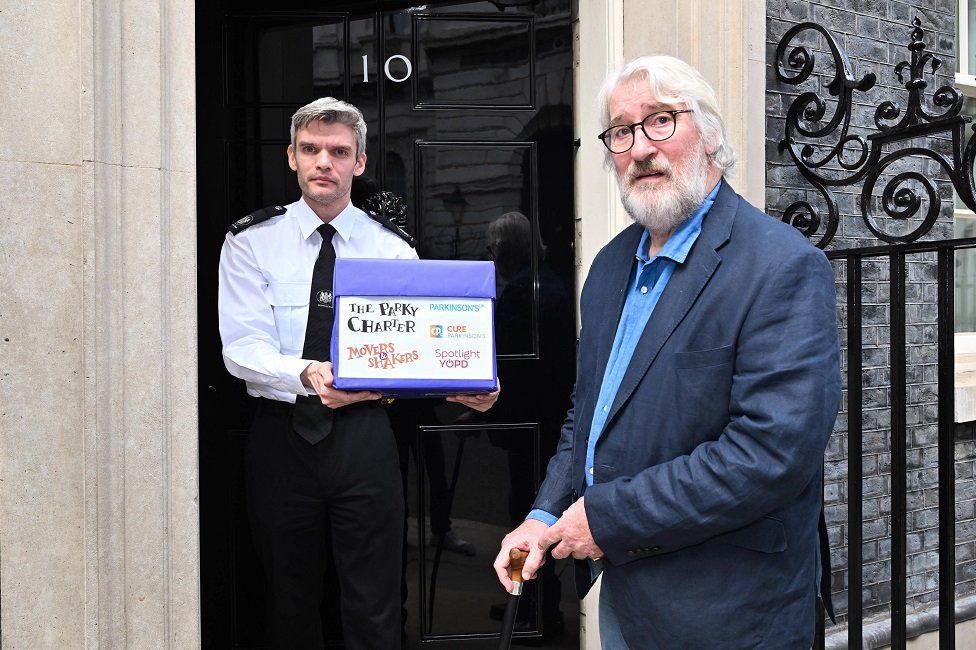
Jeremy Paxman said Parkinson’s “makes you wish you hadn’t been born” as he delivered a list of recommendations about the disease to Downing Street.
The TV presenter, who was diagnosed in 2021, marked World Parkinson’s Day by presenting a “Parky Charter” to No 10.
The charter makes five key recommendations including swift access to specialists under the NHS and increased funding to help find a cure.
Rishi Sunak said it would “receive the full attention it deserves”.
Paxman, who stepped down as host of University Challenge the year after his diagnosis, went to Downing Street on Thursday with fellow members of the Movers and Shakers podcast, which discusses the challenges of living with the disease.
In a frank admission, the former Newsnight presenter, 73, said: “[Parkinson’s] may not kill you but it will make you wish you hadn’t been born.”
Paxman criticised the government’s response to the disease after delivering a petition with tens of thousands of names, as well as the charter, which makes five key recommendations:
- swift access to specialists for individuals with Parkinson’s under the NHS
- the introduction of a Parkinson’s UK pamphlet for enhanced awareness and support
- the implementation of a Parkinson’s passport granting automatic entitlement to specific benefits
- improved comprehensive care, including regular consultations with a Parkinson’s nurse
- increased government funding for research for a cure for the disease
The prime minister praised the charter and said he was “very supportive of the excellent work that the Movers and Shakers do”.
But Paxman fears the charter and petition will have “no effect whatsoever” on the government.
He told the PA news agency: “The fact they [the government] have ignored all their responsibilities to date indicates to me that they’re not going to get any better.
“And I suspect that the form of words devised by the Ministry of Health will confirm that.
“I don’t think we’re going to get anywhere. You feel like you’re banging your head against a brick wall.”
Image source, PA Media
(L-R) Mark Mardell, Paul Mayhew-Archer, Rory Cellan-Jones, Jeremy Paxman, Gillian Lacey-Solymar and Sir Nicholas Mostyn at Downing Street on Thursday
The Movers and Shakers podcast began in February 2023 and also features former BBC journalist Rory Cellan-Jones, the broadcaster’s ex-Europe and North America editor Mark Mardell, correspondent Gillian Lacey-Solymar, the late Princess Diana’s divorce barrister Sir Nick Mostyn and Vicar of Dibley co-writer Paul Mayhew-Archer.
A Department of Health and Social Care spokesperson said: “We want a society where every person with a neurological disease, along with their families and carers, receives high-quality, compassionate care – and having a better understanding of diseases like Parkinson’s is vital in making sure we can provide the right care at the right time.
“That’s why we committed to spend at least £375m in research into neurodegenerative diseases over five years, so that we can better understand these conditions and improve outcomes for patients.”
What is Parkinson’s disease?
Parkinson’s UK describes it as the fastest growing neurological condition in the world and currently there is no cure.
It says anyone can get Parkinson’s, young or old, and in the UK roughly 153,000 people are living with the condition, with two more people diagnosed every hour.
The three main symptoms are involuntary shaking, slow movement and stiff and inflexible muscles, but sufferers can experience a wide range of other problems, including depression and anxiety.








